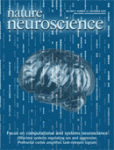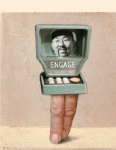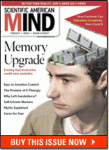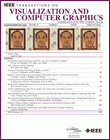Dec 07, 2005
Nature focuses on computation and systems neuroscience
Via Action Potential
The December issue of Nature Neuroscience includes a special focus on computational and systems neuroscience highlighting research presented at the Cosyne meeting held this past March in Salt Lake City.

Here is the list of contributions included in the special focus:
| A natural approach to studying vision pp1643 - 1646 Published online: 23 November 2005 | doi:10.1038/nn1608 Abstract | Full text | PDF (108K) | |
In praise of artifice pp1647 - 1650 Published online: 23 November 2005 | doi:10.1038/nn1606 Abstract | Full text | PDF (159K) | |
Analyzing receptive fields, classification images and functional images: challenges with opportunities for synergy pp1651 - 1656 Published online: 23 November 2005 | doi:10.1038/nn1607 Abstract | Full text | PDF (514K) |
14:05 Posted in Positive Technology events | Permalink | Comments (0) | Tags: Positive Technology, research tools
Dec 06, 2005
Virtual Reality and Motor Disorders Symposium
“Virtual Reality and Motor Disorders” Symposium
April 27th, 2006, Laval (France)
Laval Virtual is historically the biggest convention for Virtual Reality (VR) in Europe. With its industrial exhibition and its live demonstrations, it offers the possibility to discover and to test a wide range of interfaces and VR-based applications. Laval Virtual is also a scientific conference VRIC 2006 (Virtual Reality International Conference). On April 26-27-28th, 2006, it offers multiple opportunities of meetings, exchange of ideas, information as well as the possibility to attend the presentation of the most innovative applications of the field with lecturers from about 15 different countries and international papers published in the symposium Proceedings.
The “Virtual Reality and Motor Disorders” Symposium is a component of VRIC 2006. It will be held on April 27th, 2006. This full day symposium is dedicated to all issues regarding Motor Disorders with Virtual Reality.
Areas covered include:
- Motor disorders due to nervous system injuries;
- Motor disorders due to orthopaedic injuries;
- Balance and gait disorders;
- Wheelchair mobility.
Interest is given to the consequences of VR use on functional activities of daily living.
The “Virtual Reality and Motor Disorders” Symposium will propose a wide range of works carried out to examine the different facets of the question; will allow meetings and exchanges between experts of these different fields; and will present VR-based systems designed for the affected people.
Our guest speaker is Tamar Weiss, Director of the Laboratory for Innovations in Rehabilitation Technology (LIRT) at the University of Haifa, Israel.
Call for Papers
Submission of abstracts: January 27 th , 2006
Notification of acceptation: February 10 th , 2006
Submission of selected full papers: March 10 th , 2006
Deadline for final revisions of full papers: March 24 th , 2006
If you need more information, please contact Evelyne Klinger (klinger@enst.fr), Scientific Chair of the symposium.
We are definitely looking forward to meet you personally at Laval Virtual 2006.
Evelyne Klinger, Simon Richir & the Symposium’s Committee Program
Laval Virtual 8th International Conference on Virtual Reality
21:51 Posted in Positive Technology events | Permalink | Comments (0) | Tags: Positive Technology
Dec 05, 2005
HCI 2006: Engage!
Via Usability news
11-15 September 2006
Queen Mary, University of London
The 20th British HCI Group conference in co-operation with ACM.

From the conference's website:
This year Volume 1 papers will printed as usual, and for the first time will be published electronically with the cooperation of the ACM, see www.acm.org
In line with changes in our field, we are putting an emphasis on useful and usable research. The British HCI conference is an international forum for academics and practitioners interested in how people and technology work together. We are making no distinction between practitioners and researchers. So we say, "Farewell, Industry Day -just come for the people and the ideas"
First deadline: 3rd February, 2006
The six themes have been developed in consultation with members of the HCI community. Submissions to the conference should engage with one of the themes below and respond to the theme?s question so that the sessions at the conference can foster lively and challenging debate. There are many ways to cut each category - theories, practice, novel interaction paradigms, and so on - our aim is to bring together different points of view on each topic for lively and coherent discussion at the conference.
1. Enthralling experiences: what draws people in?
- Performance, aesthetics, emotion, and creativity: powerful engagement can be a means or an end.
2. Interactions in the wild: how does technology breach boundaries?
- The border between chaos and control changes as interactions leave the desktop and go mobile.
3. Connecting with others: what happens around and through technology?
- Interacting with colleagues and friends is helped and hindered by the connecting technology.
4. Mind, body, and spirit: how does diversity impact?
- People are different, so interactions should span age, ability, culture and gender.
5. Interactions for me: what improves my experience?
- Technology can be dehumanising but it can also improve working and social life enormously.
6. At the periphery: how can we create ambient engagement?
- Disappearing technologies, such as ubicomp, mixed media, and ambient intelligence, still engage us even though we can?t directly interact withÿthem.
HCI 2006: Engage will be hosted by Queen Mary, University of London drawing on the eclectic mix of communities and practises of the East End of London to inspire an inter-disciplinary meeting of minds.
19:09 Posted in Positive Technology events | Permalink | Comments (0) | Tags: Positive Technology
Misuse and Abuse of Interactive Technologies
"Misuse and Abuse of Interactive Technologies" CHI 2006 Workshop Date: Saturday, April 22 (Full day) Venue: Montreal, Canada, http://www.chi2006.org/
Submission Deadline: January 10
From the event's web site:
The purpose of this interdisciplinary workshop is to explore interactive systems as targets and medium of disinhibited behavior. The goal is to bring together researchers who have encountered instances of negative user behaviors in HCI, who might have given some thought to why and how such behaviors happen, and who have some ideas on how pro-active, agent based interfaces, should respond. Workshops discussions should provide a foundation for understanding the misuse and abuse of interactive technologies and for developing a systematic approach to designing interfaces that counter negative behaviors.
Some of the larger questions and issues we hope to address during the workshop are the following: - How does the misuse and abuse of the interface affect the user's computing experience? - How do different interface metaphors (embodied conversational characters, windows, desktops) shape a propensity to misuse or abuse the interface? - What design factors trigger or restrain disinhibited behaviors? - How does computer-mediated abuse differ from other forms of abuse, e.g., the abuse of people, symbols, flags sacred objects, and personal property? Is it appropriate to use the term abuse in this context? - Putdowns and other forms of verbal abuse are a part of our everyday social world. It is something we try to diffuse and avoid. How can we develop embodied conversational characters that learn to constrain users who engage in verbal abuse? Do we even need to diffuse it? - Is the act of verbally abusing a conversational agent anti-social behavior or is it the expression of social norms reflecting an asymmetric power distribution where the user is the master and the agent the slave?
As the workshop is intended to be interdisciplinary, we hope the questions and methodologies discussed will be of interest to a broad audience, including social scientists, psychologists, computer scientists, and those involved in the game industry. To help inform our questioning, we also welcome philosophical and critical investigations into the misuse and abuse of computing artifacts.
Prospective participants should send a 2/4-page position paper (following the CHI extended Abstract format www.chi2006.org/ceaf.php) to Antonella.de-angeli@manchester.ac.uk.
Further information on the workshop can be found at www.agentabuse.org.
18:57 Posted in Positive Technology events | Permalink | Comments (0) | Tags: Positive Technology
Nov 29, 2005
11th Annual CyberTherapy Conference
The Interactive Media Institute and the Cyberpsychology Lab of the UQO announce the first call for abstracts for CyberTherapy 11. The submission deadline is February 20th 2006.
Guest speaker: Pierre-Gilles de Gennes, Nobel Prize of Physics in 1991
Tentative title of his talk: Contributions of Physics to Medicine
Preconference Workshops: June 12th, 2006
Conference: June 13th - 15th, 2006, Gatineau (Province of Quebec, Canada)
Cyberarium : June 13th, 2006
Submission and Registration Deadlines: February 20th, 2006
Submission for posters, orals and symposiums.
March 6th, 2006: Authors are informed if their submission has been accepted.
March 30th, 2006: Deadline to submit a full paper (for those interested).
April 30th, 2006: Deadline for early pre-registration (see web site for details)
Early pre-registration: 350 $ (Can), 175 $ (Can) for students.
Pre-registration: 450 $ (Can), 225 $ (Can) for students.
May 20th, 2006: Deadline to register for workshops (75 $ (Can) per workshop).
June 6th, 2006: Deadline for pre-registration (only on-site registration after that date: 500 $ (Can), 275 $ (Can) for students).
Note that abstracts will be published in a regular issue of the journal Cyberpsychology and Behavior and presentations will be available in pdf on the CT11 web site the day after the conference.
More information about the CT11 conference can be found on the Interactive Media Institute website
17:06 Posted in Positive Technology events | Permalink | Comments (0) | Tags: Positive Technology
Nov 28, 2005
Nominate Positive Technology for the Medical Weblog Award!
Medgadget has announced the second annual Medical Weblog Awards. These awards are designed to honor the very best in the medical blogosphere, as decided by the readers.

The categories for this year's awards will be:
-- Best Medical Weblog
-- Best New Medical Weblog (established in 2005)
-- Best Literary Medical Weblog
-- Best Clinical Sciences Weblog
-- Best Health Policies/Ethics Weblog
-- Best Medical Technologies/Informatics Weblog
Nominations are now accepted here.
This will help the PT community to grow up and gain more visibility.
I remind all readers that Positive Technology is a not-for-profit initiative for disseminating the applications of interactive technology in mental health and well-being.
16:56 Posted in Positive Technology events | Permalink | Comments (0) | Tags: Positive Technology
Disruptive Innovations in Healthcare Conference
The Healthcare Innovation and Convergence Summit (Health IC) focuses on the most disruptive innovations occurring today, showcases the business and convergence opportunities, presents a roadmap for the future, and provides a forum specifically geared towards matching today’s most innovative new companies with investors and developers.
A two-day, four-track conference program of seminars, panels and roundtables covers new science, technology and business approaches in regenerative medicine, innovative patient care, and medical informatics.
More information on the conference website
15:28 Posted in Positive Technology events | Permalink | Comments (0) | Tags: Positive Technology
Nov 23, 2005
CHI 2006 Workshop: Designing for Collective Remembering - Montreal, Canada
Via Usability News
Event Date: 23 April 2006 to 23 April 2006
Venue: Montreal, Canada
Dates: 23 April 2006
We invite position papers for the CHI 2006 Workshop entitled “Designing for Collective Remembering”. While much research has focused on capturing and sharing personal memories, less work has addresses collective memories and their remembrance. When memories relate to significant events impacting on an entire group or community and are shared amongst that group, they become collective. Such memories are usually rich, emotionally charged, better recalled by groups and can enhance the group’s sense of identity.
This one-day workshop will offer an interdisciplinary forum of discussion for practitioners interested in designing technology for collective remembering and academic researchers in fields such as design, HCI, computer science, sociology, anthropology and information science. The workshop will facilitate discussions aimed at the development of a set of guidelines for designing systems for collective remembering. This includes designing for the experience of sharing one’s own memories, and for the experience of enjoying others’ memories.
Submissions in the form of four page position papers describing case studies of fully developed or prototype systems for collective remembering should be sent by December 18 to Corina Sas at c.sas AT lancaster.ac.uk. Theoretical approaches to design challenges for collective memories are also welcomed. Participants will be selected on the basis of the originality of their position paper and contribution to the workshop goals. The workshop will be organised as brief individual presentations, problem-based group learning activities, group presentation and full-group discussion of results.
More info under this link
16:09 Posted in Positive Technology events | Permalink | Comments (0) | Tags: Positive Technology
Nov 19, 2005
The Promise of eTherapy

17:35 Posted in Positive Technology events | Permalink | Comments (0) | Tags: Positive Technology, cyberterapy
Nov 18, 2005
Gaming for Behavior Change and Performance Enhancement
Via VR-PSYCH List
SUMMIT is holding its 4th Workshop on Games for Behavior Change and Performance Enhancement. Keynote speakers include: Mark & Brenda Wiederhold (San Diego), Barr Taylor (Stanford), Hunter Hoffman (University of Washington), and Mike Zyda (USC). The program includes a visit to the CyberTherapy clinic at The Virtual Reality Medical Center.

From the workshop web site:
Gaming for Behavior Change and Performance Enhancement – a workshop that demonstrates the exciting new possibilities for video games in the health care sector.
This workshop will be of interest to clinicians, scientist, psychologists, as well as educators and game developers.
Mark D. Wiederhold creator of “Cyber therapy,” keynotes the workshop on Sunday evening setting the stage for a full day of talks, interaction and group discussions:
-
Hunter Hoffman- The Originator and Developer of the concept of Virtual Reality for distraction as a pain therapy.
-
Barr Taylor- Developer of Virtual communities for risk reduction in teen eating disorders, smoking prevention and stress reduction in cancer survivors.
-
Michael Zyda- Developer of the wildly popular America’s Army Video Game.
-
Field trip to the unique Virtual Reality Medical Center, a cyber clinic of the future where participants will be introduced to simulators for Behavioral Change and Performance Enhancement.
09:07 Posted in Positive Technology events | Permalink | Comments (0) | Tags: Positive Technology
Nov 09, 2005
Special issue on haptics, virtual, and augmented reality - IEEE Trans Vis Comput Graph
Authors: Burdea GC, Lin MC, Ribarsky W, Watson B

10:19 Posted in Positive Technology events | Permalink | Comments (0) | Tags: Positive Technology
Oct 31, 2005
1st International Conference on Interactice Mobile and Computer aided Learning

Topics include, but are not limited, to:
- M-learning applications;
- Mobile technology support for educator and student;
- Design and development of course content;
- M-learning emerging hardware and software;
- Mobile Web and video Conferencing;
- M-learning objects and development tools;
- Service providers for mobile networks;
- M-learning standards;
- Life-long m-learning;
- Impact of m-learning on social change;
- Future trends in m-learning;
- Web and Computer-based learning;
- Tools for interactive learning and teaching;
- Platforms and authoring tools;
- New learning models and applications;
- Applications of the Semantic Web;
- Adaptive learning environments;
- Methods of content adoption;
- Project-based learning;
- Virtual campus and e-learning;
- Remote and virtual laboratories;
- Remote measurement technologies;
- Concepts for remote engineering;
- Multimedia and virtual environments;
- Cost-effectiveness
- Real world experiences
- Pilot projects / Products / Applications
For more information visit the conference web site
18:32 Posted in Positive Technology events | Permalink | Comments (0) | Tags: Positive Technology
15th International Conference on Artificial Reality and Telexistence
(thanks Régine)
December 5th-8th, 2005, University of Canterbury, Christchurch, New Zealand
ICAT is the oldest international conference on Virtual Reality and Telexistence. ICAT 2005 will not only look for innovations in the technology itself, but also explore novel ways to transfer and express information and creative ideas to the society and people.
The 15th International Conference on Artificial Reality and Telexistence (ICAT 2005), will be held at the University of Canterbury, Christchurch, New Zealand from December 5th to 8th, 2005. Christchurch is the second largest city in New Zealand, only minutes from the sea and an hour's drive from the mountains and provides a wide range of activities in the beautiful New Zealand countryside
For further information visit the conference web site
16:23 Posted in Positive Technology events | Permalink | Comments (0) | Tags: Positive Technology
Call for Papers: Narrative AI and Games
Via the Presence Listserve
A symposium part of the AISB 2006 conference, April 5th-6th 2006, University of Bristol, Bristol, England
Submissions
Papers sought in the following areas, but are not limited to:
· Interactive narrative and virtual storytelling
· Applied AI in games
· Believable synthetic agents for games or narrative
· Agent strategy planning in a games or interactive narrative context
· The application of narrative based games in education
· The use of games as test-beds for research
Submissions should be no longer than 8 pages.
Formatting instructions will be available from the symposium website shortly
Organisers
Mr Sandy Louchart – Salford University
Dr Judy Robertson – Glasgow Caledonian University
Further information
http://www.nicve.salford.ac.uk/AISB06
15:42 Posted in Positive Technology events | Permalink | Comments (0) | Tags: Positive Technology
Oct 26, 2005
Visual Art & the Brain Conference
Via BrainBlog
The conference Visual Art & the Brain: At the Interface of Art and Science will be held at the City University of New York (CUNY) November 5, 2005. The goal of the conference is to explore the link between science and art.

This conference will explore the nature of the science-art interface, the inspiration this interface provides to scientists and artists alike, and the impact of such interactions on areas of research and other human endeavors. The morning session will explore scientific perspectives: What is vision? How do we perceive art and why do we respond to it emotionally? The afternoon session will focus on the interface of art and science, and will feature discussions with artists and scientists on communicating the beauty and power of science as well as its social and ethical implications. This event is suitable for scientists interested in art, and artists interested in science.
For more information, visit the conference web site
15:47 Posted in Positive Technology events | Permalink | Comments (0) | Tags: Positive Technology
Oct 24, 2005
Third International Design and Engagability Conference
Via Usability News
The third International Design and Engagability Conference (IDEC) will be held in late 2006.
The conference consists of international researchers from Europe, the United States and Australasia. The conference is targeted at other researchers interested in engagability, and businesses interested in designing their products and services around engagement with consumers. Guest speakers so far include David Benyon of Napier, University, Mike Williams and Suzanne Begley of Public Life.
IDEC 2006 format will consist of a short keynote address at the beginning followed by speakers presenting their papers in twenty minute slots. Delegates will be able to ask questions and there will be. Delegates will be able to ask questions and take away the proceedings.
The themes include, but are not limited to:
• Aesthetics
• E-commerce
• E-health
• Games
• Industrial design
• Interactive arts
• Mobile Computing
• Mobile Media
• Performance
• Product Design
• Three Dimensional Design
• Visual Communication
14:13 Posted in Positive Technology events | Permalink | Comments (0) | Tags: Positive Technology
Aging by Design conference

The two-days conference has explored the intersection of the rapidly-growing aging population and the world of business and technology. Topics included current research on the impact of aging on design, methods for interacting with the aging population (requirements gathering and testing), aging in the workplace, design case studies and business opportunities.
14:08 Posted in Positive Technology events | Permalink | Comments (0) | Tags: Positive Technology
Oct 22, 2005
Virtuality 2005
6th International Conference on Digital Cinema, Virtual Reality, Computer Graphics, 3D animation and special effects
The conference will be held in Turin, 3-6 November 2005
Visit the conference web site for further information
See you there
19:14 Posted in Positive Technology events | Permalink | Comments (0) | Tags: Positive Technology
Oct 20, 2005
Personal and Ubiquitous Computing on Experience, Enchantment, and Interaction Design
Via Usability News A special issue of Personal and Ubiquitous Computing is calling for contributions about "Experience, Enchantment, and Interaction Design".
An indicative list of possible topics is:
- The enchantment of digital technology
- Novel and enchanting interactions
- The possibility of designing for enchantment
- Measuring and evaluating enchantment
- Approaches to enchantment from art, design and literature
- Critical theory
- Designing for experience, openness and potential
- Design practices to confer depth on a design
- Ambiguity, depth and meaning in interaction design
- Relationships between enchantment and other varieties of experience
Important dates
Paper Submission: 25 November, 2005
Notification of acceptance: 27 January 2006
Final Corrections to papers: 31 March, 2006
13:39 Posted in Positive Technology events | Permalink | Comments (0) | Tags: Positive Technology
First International Conference on Persuasive Technology and Well-Being
From the conference website
Can computers help fight obesity? Can technology motivate you to waste less energy? Can communication devices help overcome racial prejudice? Can a virtual agent persuade you to break your smoking habit? Can a mobile phone help you study? Can a robot challenge you to perform rehabilitation exercises?
PERSUASIVE 06 is aimed at exploring technology in the service of human well-being, within the broader context of a socially and ecologically sustainable society. Join academic researchers, designers, and technology developers from around the world in investigating the potential of persuasive technologies to positively affect human attitudes and behaviour.
The goal of PERSUASIVE 06 is to bring together a multidisciplinary group of social scientists studying persuasion, and engineers developing persuasive technologies in areas such as health and rehabilitation, housing, information and communication, and energy conservation, so they can meet, share experiences, present research, and exchange ideas. Key topics include:
· Health, comfort, and wellbeing
· Sustainability
· Education and training
· Communication
· Ethics of persuasive technology
· Theories of persuasion and related topics such as motivation, credibility, trust and control
· Persuasive technologies as change agents
The conference will take place 15-16 May 2006 hosted by Eindhoven University of Technology, the Netherlands
13:30 Posted in Positive Technology events | Permalink | Comments (0) | Tags: Positive Technology






